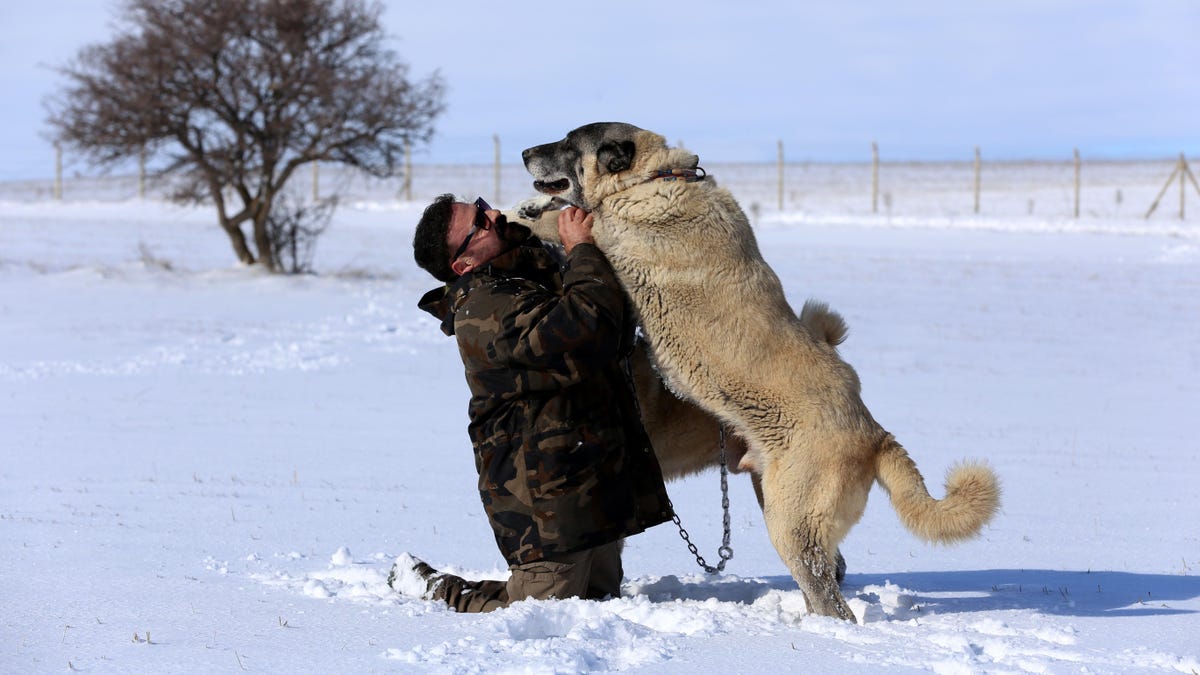New Drug Could Extend the Lifespans of Giant Dog Breeds::The drug, LOY-001, could be available to the public as soon as 2026.
In captivity a gray wolf can reach 70 kg and live to 15 years old.
There is no reason for large domestic dogs to be short lived except the horrible things that inbreeding has done to them.
Not that breeding hasn’t created a lot of issues in many dog breeds, but something I always notice with wolf stats is that their lifespan in captivity is always listed as “up to” and I don’t tend to see anywhere saying what an average lifespan in captivity is. Maybe that stat is out there but in my casual googling around I don’t think I’ve seen it.
Which makes me think that some of those life span claims may be based on outliers. You get the odd dog that lives past the average life expectancy for it’s breed too, but it would be a bit misleading to say that French Mastiffs can live to be up to 12 years old because a couple have lived that long even though the average lifespan is half of that.
And let’s not forget that the grey wolf’s native range was almost the entire northern hemisphere in just about every climate imaginable. That leaves a lot of room for different populations with genetic variations. Different populations of wolves can vary pretty greatly in size, Indian and Arabian wolves only average around 25kg, north American wolves about 36, European wolves around 38.5, and while places like Alaska and Russia have turned out a few giants in the 70kg+ range, wolves over 54kg are overall pretty uncommon. That puts a lot of wolves in the same weight class as a medium or large sized dog, not giant breeds, and 15 years, while not exactly common, isn’t quite so unheard of either for a lot of breeds in that weight range.
And trying to find specific stats on the lifespan of those different wolf populations is definitely outside of what I was able to find with a little casual googling and skimming Wikipedia.
Of course 15 years might very well be a perfectly ordinary lifespan for a wolf. I don’t know, I don’t feel comfortable saying one way or the other from the stats I was able to find with the amount of effort I was willing to put into it, and I’m certainly no biologist studying wolves or anything of the sort.
I started googling this earlier today to comment on a different post about this where someone asked about what the lifespan of dogs would be without human meddling, and I thought to myself “well that’s basically wolves.” And I started off intending to skim a few pages for the relevant numbers and say something like “wolves live about X much longer than similarly sized dogs” with “X” being kind of an average from a few different sources because I expected some variation in the numbers, but I saw a lot more variation in the numbers than I expected, and some of the way things were phrased felt like they were answering different questions than what I was asking, which kind of sent up some red flags for me, and I ended up not commenting on that time because I didn’t feel like I had a solid answer.
I still don’t, but in this context I think it’s important to stop and think about the data and ask questions like
Are the wolves that get up to 70kg the same ones that can live up to 15 (or I even saw claims of up to 20) years? Or is it maybe smaller wolves that can live that long? Are we making fair comparisons between dogs breeds and similarly-sized wolves, or are we comparing giant breeds to the smallest wolves out there?
Are these ages averages, or are they the top end outliers that are more of a theoretically maximum than something that’s likely to happen?
Is the genetic diversity of different wolf populations being taken into account properly?
How fair is it to compare the lifespan of wolves and dogs? They’re closely related to be sure, to the point they’re generally considered to be part of the same species, but there’s also very significant differences in their biology as well.
I hope someone is more dedicated than I am and can dig up the data I’m looking for, and my gut says that wolves probably do have longer potential lifespans than dogs, but I’m not very confident in just how big the difference is.
deleted by creator
As someone with a big breed rescue I’m super excited for this. My dog is only 5 years old and has no issues yet but it has been great seeing him develop so quickly and I’d very much like to see him live longer for a fuller life experience.
This is the best summary I could come up with:
The animal pharmaceutical company Loyal announced that the FDA has accepted the development of a drug that could extend the lifespans of large and giant dog breeds.
In a blog post published today, Celia Halioua, the founder and CEO of Loyal, said that the company earned the FDA’s acceptance of the drug.
“In regulatory parlance,” Halioua wrote, “we have completed the technical effectiveness portion of our conditional approval application for LOY-001’s use in large dog lifespan extension.”
Giant dogs are the ones that might make you gawk on the street: Great Danes, Irish wolfhounds, and Anatolian shepherds to name a few.
“At Loyal, we see the short lifespan of big dogs not as inevitable, but as a genetically-associated disease caused by historical artificial selection, and therefore amenable to targeting and treatment with a drug.”
According to Halioua’s post, breeding large dogs for their size caused elevated levels of IGF-1, a hormone that promotes cell growth.
The original article contains 431 words, the summary contains 155 words. Saved 64%. I’m a bot and I’m open source!
deleted by creator
According to Halioua’s post, breeding large dogs for their size caused elevated levels of IGF-1, a hormone that promotes cell growth. Though this hormone contributes to the animals’ great size, it also hastens their aging. LOY-001 reduces the levels of IGF-1 in large and giant dog breeds, extending healthy life spans.
Would that also cause them to grow to smaller sizes? (I suppose that may depend on whether this drug is administered before or after the dog is full-grown though)
This drug will only be administered to dogs who are at least 7 years old and 40+ lbs
By how much are we expecting this drug to expand the lifespan of dogs? I read the article and could not find it. Anyone here know?





